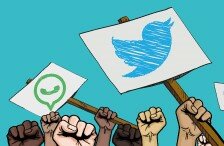Allyship Fatigue – A real thing or a fancy way of saying white people got bored?
By Ellie Powell
The world is falling to pieces; war, pandemics, poverty, racism; everywhere you look there is another pressing issue which requires time and attention to solve and combat. The rise of social media has meant we are no longer only susceptible to news which directly relates to ourselves but can consume content and information from halfway across the world almost immediately as it unfolds.
2020 saw the digital world join forces in conjunction with the BLM movement in the US, inciting protests across the world. The protests and momentum surrounded the movement lasted for a while, but before long, interest simply died out. The world become accustomed to the pleas of the protest, and the news of racism and corruption in the police force fail to shock or surprise us. This makes allies complacent, and they become disinterested. We can see this happening now with the invasion of Ukraine. At first, the world is shocked, angry, and afraid; but eventually, become expectant of news of bombings, deaths, and violence.
Social media support for BLM and now for Ukraine, started in droves but ultimately allies become ‘bored’ and select another injustice which needs their attention. These performative actions often take the form of cutesy Instagram infographics, Facebook profile picture stickers or hashtags rather than actual donations or resources. Allies become tired of the situation once they realise their actions (or lack thereof) aren’t accomplishing anything, but instead of changing action instead choose to ignore the issue and find another problem to tweet about. This descion to simply ‘move on’, is a privilege awarded only to those who remain unaffected from racism and war.
On the 2nd of June 2020, Instagram users worldwide took part in what is known as #blackouttuesday. This was a day when the only posts seen on the site were of black squares with the hashtag in the caption. The movement was originally meant as a collective protest against police brutality, but actually ended up being a competition of who could show they ‘cared’ the most without actually committing to any action. How long before we see a similar performative action in regard to supporting the Ukrainians?
Perhaps it’s unrealistic, what, with the scale of information and the sheer number of pressing issues that everyone can keep up with the same level of energy without burning out or losing heart when these issues remain unsolved. The age of social media-led activism has a host of brilliant qualities and can relay information which would otherwise be withheld to only the communities or countries the issue affects. But with this mass information comes a huge number of performative clicktivism by allies to engage but never to resolve.
It’s an uncomfortable truth that just because our Instagram explore pages has returned to ‘normal’, does not mean the problem has disappeared; it just means the world has come to accept it and it’s not as interesting. But don’t feel too bad, there’ll soon be another natural disaster/ virus/ systemic racist institution (delete where appropriate) for the keyboard warriors to divert their attention to next.


